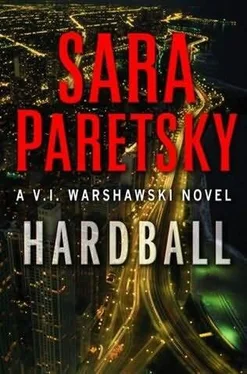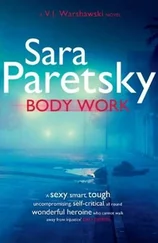I brought the conversation back to Lamont and Steve Sawyer to see if she’d be willing to try to talk to Johnny about them. “They’ve been missing forty years now. Your dad is the one person who might know what happened to them, but he doesn’t trust me.”
She shook her head. “I’m not doing any work for the police. Maybe my dad did some things he shouldn’t have, but he’s sixty-seven. I don’t want him dying in prison because I helped tack another twenty-five years onto his sentence.”
“Maybe his old buddies aren’t dead,” I suggested. “Or maybe if they are, he didn’t kill them but knows where their bodies are.”
She was resolute. “Enough ‘maybes’ build a whole hive of bees, and I don’t want to be part of it.”
We left it at that. The conversation sent me home depressed. The only helpful news I’d gotten today was a text message from Karen Lennon’s friend, the nun who’d been with Harmony Newsome when she died. Sister Frances wrote that she’d be back in Chicago Sunday night and asked that I meet her at her apartment on West Lawrence after supper on Monday.
On Saturday, in response to Petra’s wheedling, I got up early to take her on a tour of our family’s South Side history. We started in Back of the Yards. Nowadays, nothing is left of the massive meat-packing houses that used to cover two city miles except for one small kosher shop, which provides lamb to Muslim and Jewish butchers around the Midwest.
Petra and I parked on Halsted and walked through the giant gates where drovers used to register their cattle shipments. It was hard for either of us to imagine the days when tens of thousands of cattle were unloaded every day and the drainage ditches ran with blood and offal.
“My dad used to tell me that during the Depression, when he was growing up here, the yards were the most popular tourist attraction in the city,” I told Petra. “When the World’s Fair was held along the lakefront in 1934, more people lined up here to watch cattle being killed than went to the fair.”
“Ugh! I can’t imagine. All the blood and stuff might make me a vegan, and then Daddy would have six heart attacks and disown me right before keeling over.” She laughed merrily at the notion.
We walked across Exchange Place, past the remains of the International Amphitheatre, to Ashland Avenue. The Beatles had played the Amphitheatre just a few days after the Marquette Park riots. My dad had to help with crowd control. I remembered how upset he and my mother were. The riots had kept him away from home round the clock for a week, and now, because of “hysterical teenagers,” in my mother’s bitter language, he had to go straight back out.
“I begged him to take me with him. I was a bit young for full Bea tlemania but was catching the fever. It was such a relief to have something fun happening on the South Side for a change. He let me and one of my girlfriends sit in the back of his squad car. We got to see the Fab Four pretty close as they went inside.”
Petra rubbed my forehead. “I touched the eyes that saw Ringo!”
Laughing and kidding together, we meandered through the old neighborhood. Saturday is a busy time in any part of town: shopping, laundry, kids’ sports, yard work, car repairs, all bring people into the streets. Ashland Avenue was crammed with women lugging children and groceries. Girls playing hopscotch and double Dutch, the staples of Chicago sidewalks, slowed progress even more.
All down the street, heads turned as we passed. Petra, towering over the crowd, her spiky blond hair shining like a Roman helmet, was startling, a freak show traveling through the neighborhood.
“When I was little, Granny Warshawski already lived over in Gage Park. My dad took me by here once just to show it to me, so I hope I remember which building he grew up in.”
This part of Ashland is still vibrant. Light industry has filled in some of the holes left by the stockyards. People tended their little gardens. The tenements were covered with fresh paint, but underneath the uninsulated siding remained. These wooden row buildings dated back over a century, to when Upton Sinclair wrote The Jungle.
When my dad lived here, they hadn’t had running water or central heating. He used to have to stoke the furnace on winter mornings. Running water finally arrived in the fifties. The pipes were attached to the backs of the buildings, as they had been to my childhood home on South Houston. You got just enough water into the house to supply the kitchen, so a tiny bathroom with a handheld shower was installed behind a makeshift partition near the kitchen sink. I could still remember the first time I visited a college friend in her Oak Park home. It seemed so luxurious to have a second bathroom, and a big tub to stretch out in.
A woman came up the walk with a toddler and a shopping cart in tow. Petra turned to her eagerly, asking, in competent Spanish, if we could look inside. “Mi abuelita vivía antes en este apartamento” (My grandmother used to live in this apartment).
The woman looked at us doubtfully but shrugged, and gestured to us to follow her in. Petra and I helped her carry the heavy cart-loaded with bottles of pop, milk, and topped with clean, folded towels-up the steep wooden steps. Inside the narrow hallway, crammed as it was with bicycles and strollers, Petra’s high spirits became subdued.
“Which one did Granny Warshawski live in?” she asked me.
“Second-floor front,” I said.
“The Velázquez family,” our guide said in English. “She’s not home. But the father’s mother stays with the baby. Maybe she’ll let you look.”
She called to the toddler, who was staring dumbstruck at Petra. Mother and child went on down the hall, the child looking back over its shoulder at us. We climbed to the second floor and knocked on the Velázquezes’ door. We could hear a baby wailing and a television blaring in Spanish. After a moment, we knocked again, and then heard a voice asking in Spanish who was there.
My cousin called back, also in Spanish, explaining our mission. Our grandmother’s old home, could we have a quick look? A suspicious silence on the other side while we were inspected through a peephole and then the sound of many locks scraping back and the rickety door being pulled open.
We were instantly inside the apartment. No foyer, or other formality, stood between us and the front room, where a sofa bed stood open. The baby, who was about ten months old, lay on it, still crying. An older sibling in front of the television turned to look at us. He shrieked and ran behind his grandmother.
My cousin stooped and began playing peekaboo with him. In another minute, he was laughing, trying to grab her spikes of yellow hair. The baby, struck by her brother’s laughter, stopped howling and pushed herself to a sitting position. In a second, she had scooted to the edge of the bed. I picked her up before she fell off and sat her on the floor. In the midst of the chaos the grandmother apparently decided that the easiest course was to let us take a quick look around.
I don’t know what Petra thought she’d find. Sixty years, and who knows how many families, lay between our grandparents and the current tenants.
My cousin looked in the four rooms quickly, saw the arrangements made to accommodate five children and three adults: sofa bed, bunk beds, air mattresses under the dining-room table, clotheslines hung with diapers and clothes, toys stacked under beds.
Wrinkling her forehead in puzzlement, Petra asked the grandmother where the family stored their other belongings. The older woman had been reasonably friendly until then. Now she frowned, and snapped off a volley of Spanish too complex for my primitive knowledge, except for “espías,” “narcóticos,” and “immigracíon,” which she kept repeating. My cousin stammered a few words. But, a moment later, we found ourselves on the far side of the door.
Читать дальше












